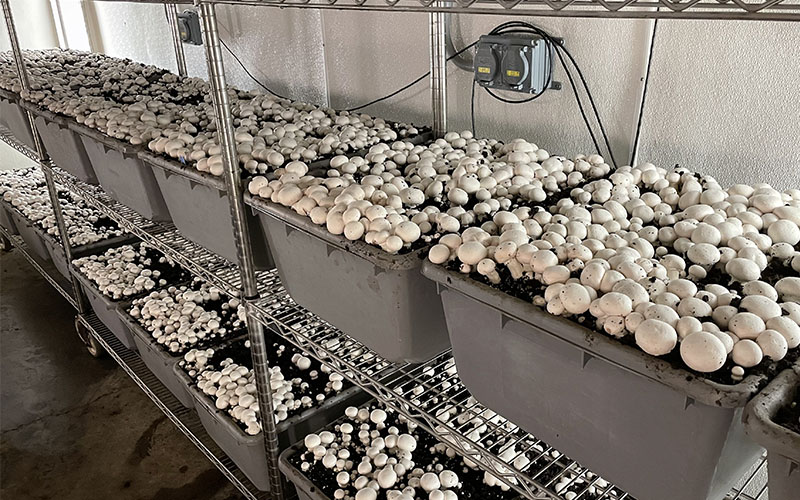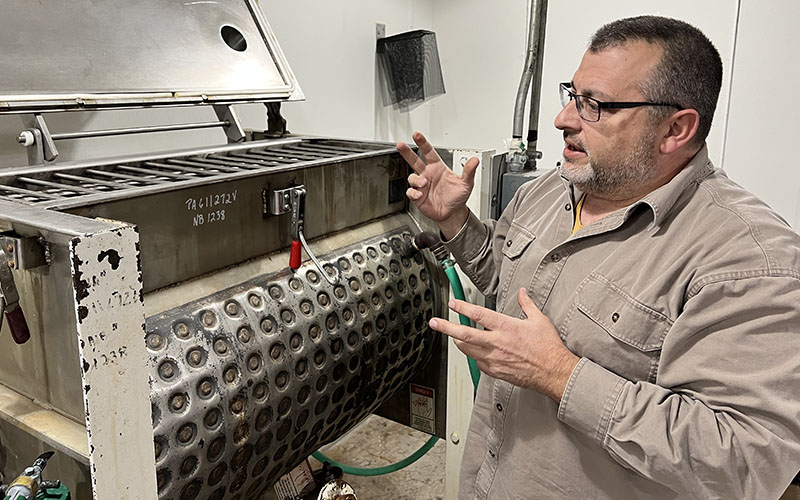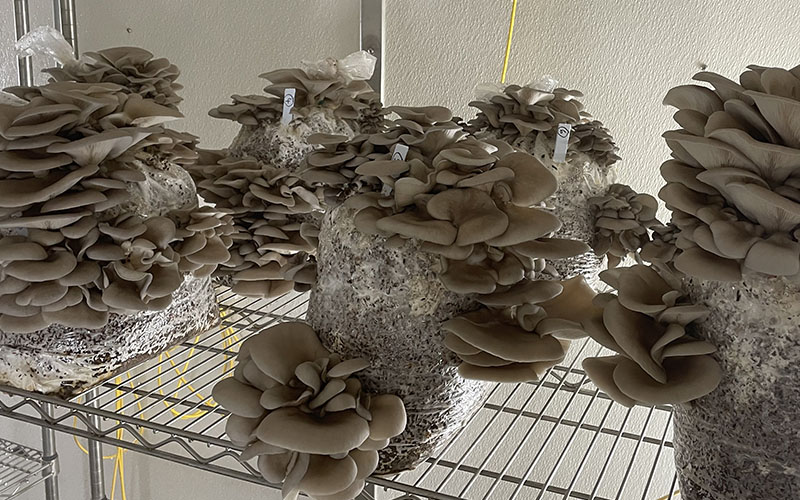By Sean Yoder

Pennsylvania is the #1 mushroom producing state in the country and Penn State’s one-of-a-kind mushroom science program is unlike any other in North America.
Pennsylvania’s mushroom cultivators produced 446.58 million pounds of white button mushrooms and accounted for 66 percent of the total volume of sales during the 2021-2022 growing season, according to the United States Department of Agriculture. The small town of Kennett Square produces half of the country’s mushrooms.
Most of the state’s mushroom farms are clustered in southeast Pennsylvania, with farms in Chester County producing more than half a billion pounds per year. Larger operations are putting out 10-50 million pounds of mushrooms each year, while one of the largest farms produces 2-2.5 million pounds per week.
Penn State traces its mushroom education and research history back to at least the 1920s, when researchers were working with growers to combat disease, and later on different methods of spawning in the 1930s. The mushroom spawn lab work continues to this day, with the culture collection containing nearly 300 strains of white and brown mushrooms and 200 other species like shiitake and oyster.
With the specialty crop industry centered in Pennsylvania, Penn State has developed a mushroom science and technology program unlike any other in North America.
With the specialty crop industry centered in Pennsylvania, Penn State has developed a mushroom science and technology program unlike any other in North America, said John Pecchia, associate research professor at Penn State’s Department of Plant Pathology and Environmental Microbiology, which is housed in the College of Agricultural Sciences.
On the north side of the University Park campus along Big Hollow Road, a long, low building houses the Mushroom Research Center (MRC). Current research at the MRC focuses on a couple of main objectives. First, trying to increase bio efficiency, meaning more yield per substrate and increased profits for cultivators. Second, much of the work for the plant pathology department focuses on diseases, an ever-present problem in every corner of agriculture.
“Just like corn or soybeans or apples, most of those have fungal, bacterial pathogens, viruses and pests,” Pecchia said. “So we do a lot of work looking at controlling disease and pests.”

Other research objectives include working with economists to help analyze the profit component of the industry. Penn State’s food science experts have been key in helping the growers with food safety issues and making sure that they comply with food safety regulations. They also participate in research on mushroom shelf life, nutritional benefits and nutritional profile.
One of the main ways the university and its researchers and educators interface with the mushroom industry is the yearly Mushroom Short Course, started 65 years ago, which provides mushroom growers with the latest research and expertise. Short Course curriculum focuses on industry best practices, like food safety, disease and pest management, cultivation practices, spawn technology and energy usage. The university’s mushroom experts also leverage Penn State Extension, and faculty are constantly updating literature and working with Extension staff to develop educational materials for the industry.
The university’s mushroom experts are constantly updating literature and working with Penn State Extension staff to develop educational materials for the industry.
Penn State researchers and educators also serve on a number of industry committees, giving valuable feedback on current challenges.
“It’s hard to exactly say what the needs are going to be because it changes, you know, whatever the hot topic is for the moment,” Pecchia said. “So we try to plan mid- to long-term research objectives and goals to help the industry as well as be there [for them]. And that’s one of the things that serving on these committees allows us to do is be there and communicate with them when they have whatever issues popping up.”
Pecchia, who earned his Ph.D. from Penn State and returned to work there in 2005, said he’s enjoyed getting to know the growers, tackling new problems and collaborating with other researchers.

Next gen mushroom harvests: IoT sensors aid in cultivation and disease prevention
Recently, researchers and designers from the College of Information Sciences and Technology revealed their project Cropsmarts, a suite of digital applications integrated with custom-built “Internet of Things” technology. Cropsmart’s sensors can take daily measurements of things like temperature and humidity, and even detect the presence of pests and disease.
Projects like Cropsmarts are directly helping mushroom cultivators compile data and quickly and easily identify environmental patterns affecting their crops. Although mushroom cultivators face many of the same challenges as growers of crops like corn and wheat, such as battling diseases and adapting to changing regulations, mushrooms are environmentally sensitive and grown indoors in controlled climates. Much of the work for mushroom cultivation is still done by hand, not machines. Pecchia said Penn State recently received a large grant from the USDA to work on mechanized harvesting for U.S. growers.
“Mechanized harvesting would be huge if we can figure out a way to make it efficient for growers,” he said.
“New projects are always fun, different things pop up, like labor is something that we just started diving into a few years ago,” he said. “Totally out of my expertise, but you know, working with engineers bringing some pretty neat ideas that they’ve worked with on that. So the collaboration outside of my area of expertise is fun.”






